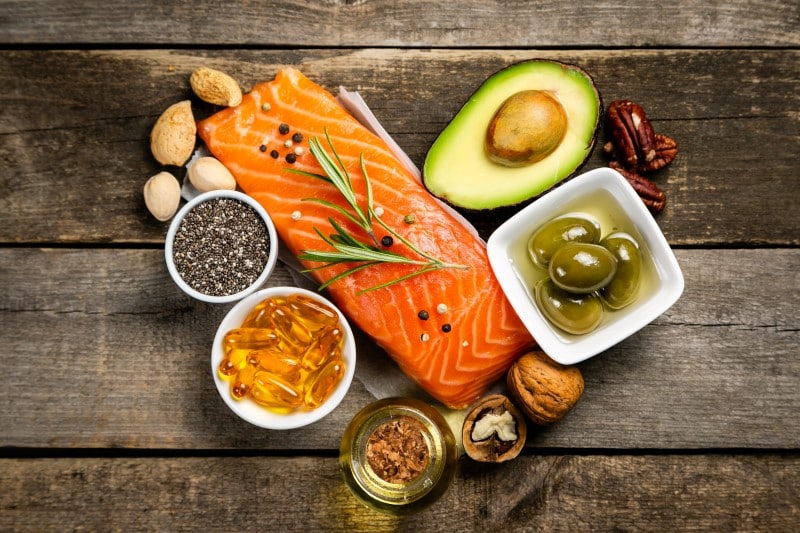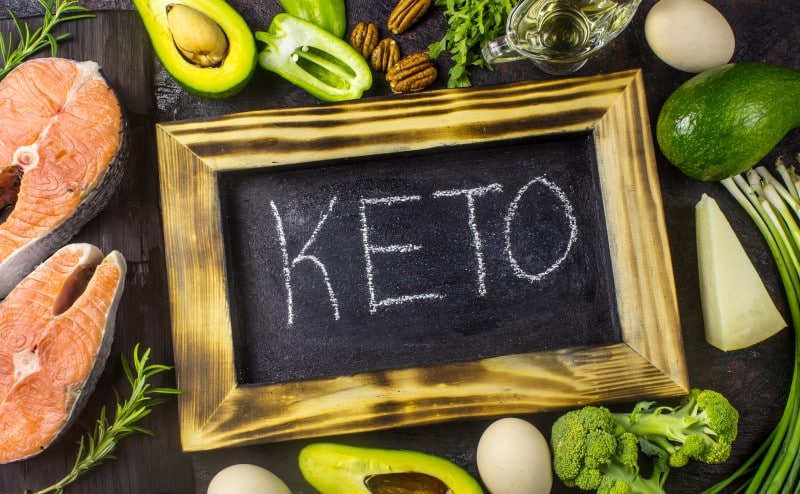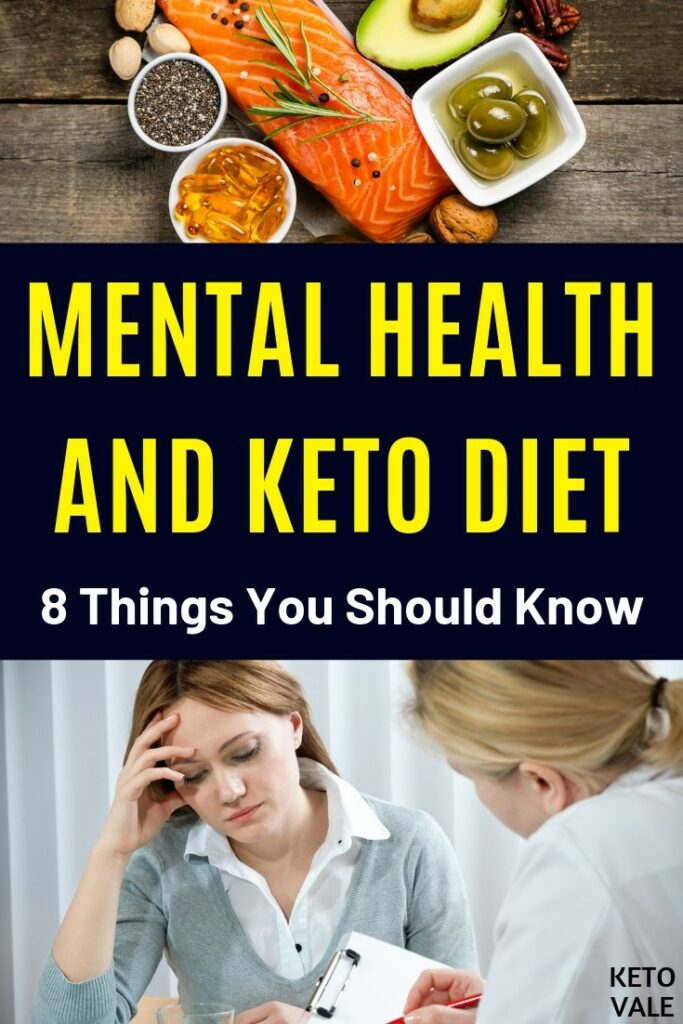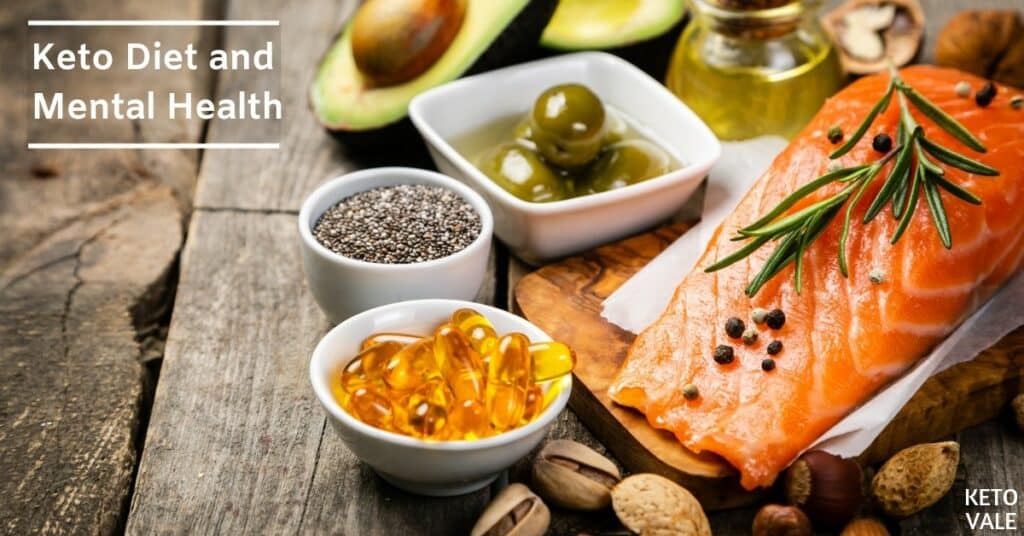The keto diet is not only beneficial for weight loss but it also has a profound effect on human health. One of keto’s possible benefits is its effect on mental health and wellbeing.
Although studies on keto and mental health are few and insufficient at this point, there’s an abundance of anecdotal evidence of people feeling better and seeing a definite improvement in their mental health with keto.
A number of different mental illnesses and disorders could get better with a ketogenic diet, such as depression, anxiety, bipolar disorder, and more.
Psychologists and psychiatrists around the world are starting to examine the connection between a low-carb lifestyle and improved mental health and sometimes recommend this diet to their patients.
And while researchers don’t have all the answers yet, adopting a ketogenic or a low-carb lifestyle can prove to be a powerful strategy in achieving a better mental health.
At the very least, it won’t hurt to try – if done correctly, the keto diet has an outstanding safety profile. If you’re taking any medications for a mental health condition, however, consult your doctor first.

Is Mental Health Related to Food?
How is keto superior to the standard American diet in terms of mental health?
The relation between your mental health status and the food you eat is definitely present, and it’s a very complex one, although not fully understood yet.
There are, however, a few things that we can be more or less sure of.
#1. A diet high in processed food has been linked to depression
According to a few studies, including a recent one by Akbaraly et al., people who eat lots of processed food tend to develop symptoms of depression more often than those who eat mostly whole, natural food (1).
In this regard, a well-structured diet that is based mostly on unprocessed food (like keto, low-carb, paleo, the Mediterranean diet, and so on) can play a beneficial role to keeping depression at bay (2, 3, 4, 5).
#2. Excessive sugar consumption has also been linked to worsened mental health
Added sugar is plentiful in today’s world, and having too much of it too often has a profound impact on our mood and even our mental health.
If you have ever felt sluggish and tired after a big meal heavy in carbs, you know the immediate impact that a blood sugar spike and the consecutive drop can have on your wellbeing.
The long-term effects can be of a similar magnitude but are less obvious.
Having too much sugar in your diet can lead to inflammation and damage to your neurons; anxiety and depression.
While these conditions are not directly caused by excessive sugar, they can definitely be worsened by it, and populations who consume more sugar are more susceptible to them (6, 7, 8, 9, 10, 11, 12).
Even patients with schizophrenia can benefit from dietary interventions that limit sugar (13).

#3. Healthy fats are associated with better mental health
Omega 3s (present in fish and seafood, two 100% keto-friendly types of food) are important not only for your cardiovascular health but also for your brain function (14, 15).
They can lower inflammation in the body and thus help improve the symptoms of depression, too (16).
Olive oil, another healthy fat, has also been found to have anti-inflammatory properties, which, again, leads to a lower risk of depression (17).
That’s also why people following a Mediterranean-style diet (rich in olive oil in particular) suffer from depression less often than the general population (18).
Trans fats, on the other hand, can have a significant detrimental effect on patients who are prone to depression (19).
#4. Micronutrient deficiencies can also affect mental health
Studies have demonstrated that people who have experienced a first episode of psychosis suffer more often from specific deficiencies, such as in folate (B9), and vitamins D and C than the general population (20).
Patients suffering from schizophrenia can have their symptoms improve with B-vitamin supplements (21).
Eating a diet that predominantly consists of whole, natural food, is your best bet if you want to avoid micronutrient deficiencies.
Veggies, meat, eggs, seafood – all of the staple foods of the keto diet – are very nutrient-rich: they have all sorts of vitamins and minerals in them and can help you keep common deficiencies at bay.
#5. The link between physical and mental health is profound and goes both ways
A decline in physical health will definitely decrease your sense of wellbeing and happiness, just as well as a decline in mental health will often leave you physically more vulnerable to illness.
Therefore, achieving better physical health (with the help of diet and lifestyle changes) will definitely leave you feeling better overall and will impact your mental health in the long run.

Keto’s Effects on Your Well-Being
A number of existing studies have looked into the way diet can affect mental health, although very few of them examine the effect on keto in particular.
Nevertheless, an overwhelming amount of anecdotal evidence on keto’s effects on your wellbeing can be found online, and this is felt both by people who are suffering from a mental health issue and by those who aren’t.
Let’s look into the possible effects of a keto lifestyle on your well-being, as reported by a huge number of people across the world from from the keto communities, forums and Facebook groups:
- Improved energy levels
Feeling more energetic and motivated is a common effect on keto, especially once the keto-flu is over.
Feeling more awake and alert is reported by many, as well as feeling more driven and proactive.
- Better focus and concentration
Mental fog and fatigue are often related to unstable blood sugar levels, and with stabilizing them, focus improves greatly.
Superior mental clarity and an improved ability to concentrate (for longer periods, too) are felt by most people on keto.
- Better stress response
Feeling calmer and less stressed is often reported by people who do keto long term.
- Better mood
Feeling more optimistic and happy is another thing many people experience.
This is possibly related to eliminating added sugars and their strong negative effect on mental health.
- Feeling more confident
While this one isn’t directly related to keto, losing weight on keto and getting healthier is very likely to give you a confidence boost and make you feel better overall.
Combine that with some sort of sports and the effects will be even better.
- Being in control of the food you eat might feel very empowering
Although at first, the keto diet might look quite complicated, it does come with a steep learning curve.
One of its benefits is that it will give you a much better idea of nutrition and how it affects you.
If you were prone to having strong cravings and to overeating occasionally, sticking to a keto diet might be exactly what you need to take back the control.
What is the Mechanism of Action by Which the Ketogenic Diet Affects Mental Health?
We don’t know yet.
Researchers are unsure whether it’s the ketones in the blood, the stabilized blood sugar and insulin levels, the elimination of added sugars, the improved insulin sensitivity, or – most likely – a combination of all of those factors.
Other factors might also play a significant role. For example, the keto is a diet rich in natural, unprocessed food (which, among other things, if done correctly will help prevent nutritional deficiencies).
Getting a lot of healthy fats in your diet is another possible factor, as these are extremely important for the proper functioning of your brain.
Being able to successfully manage the symptoms of physical conditions that are commonly associated with a worsened mental status such as prediabetic states, type 2 diabetes, metabolic syndrome, insulin resistance, and more – could also help people who suffer from a decline in mental and physical health.

Which Mental Conditions Could the Ketogenic Diet Be Beneficial?
There are a number of mental health conditions that could be positively influenced by a ketogenic diet.
Again, studies are sparse and inconclusive at the moment, but anecdotal evidence is abundant.
Here are the conditions that could be positively influenced by keto.
- Depression
One of the most common mental health conditions, depression affects more than 300 million people worldwide, so managing it with the help of diet could potentially improve the quality of life of a great number of people.
Currently, there is one study from 2014 by Sussman et al. examining the potential antidepressant properties of the ketogenic diet in mice (22).
It was found that the ketogenic diet does have a mild antidepressant effect on rodents, although the mechanism of action remains unclear.
While this cannot be translated into conclusions on human psychology, it definitely shows us that there is a potential benefit in studying that question further.As for anecdotal evidence, it is abundant.
Eliminating refined carbs from your diet, eating more healthy fats, having a diet rich in whole, natural food, and achieving better blood sugar control with the help of keto can prove to be extremely beneficial for someone who suffers from depression.
Keep in mind that the induction phase (i.e. the keto flu) can be particularly tough for you if you are depressed. Don’t give up, though – you’ll soon feel better.
- Anxiety
Anxiety disorders are incredibly common: thy currently affect 18% of the US population.
Again, studies are inconclusive for the moment – there is one study on rodents, where adding exogenous ketones (learn more here) to their regular diet resulted in lower anxiety levels (23).
Another study, again on rodents, where a caloric reduction combined with a ketogenic diet had a positive effect on anxiety (24).
The keto diet is well-known for its mood-stabilizing properties and might help reduce anxiety symptoms in humans, too.
- Alzheimer’s
There is a small but promising pilot study by MK Taylor et al. from 2018, showing that 10 patients with mild Alzheimer’s had a significant cognitive improvement from a 4-month long dietary intervention where they were eating a ketogenic diet and a relatively big amount of their calories was coming from MCT oil (25).
Patients were able to follow the diet with the help of a caregiver and tolerated it well.
The study is rather inconclusive since there was no control group and the number of participants was limited, however, its results look very promising, so further research is needed.
- Bipolar Disorder
Bipolar disorder does share some characteristics with epilepsy (for which a strict ketogenic diet is sometimes a viable treatment option), such as disturbances in similar neurotransmitters (serotonin, GABA, glutamate and more), and sodium/calcium disbalances, among others.
For that reason, anticonvulsant medication is sometimes prescribed to patients with bipolar disorder and can prove to be an effective method for managing the condition (26).
There are good reasons to believe that bipolar disorders could be positively influenced by a diet that is very low in carbs, but, again, studies to prove that are lacking for the moment.
There is one study that followed 2 women with bipolar disorder for 2 years, and they both noticed a significant improvement in their symptoms on a ketogenic diet (27).
Some people report an improvement on keto, sometimes significant, while others achieve better success with medication or a combination of the two.
- Attention Deficit Hyperactivity Disorder (ADHD)
Kids and adults with ADHD might see an improvement with strict keto.
Researchers have observed better concentration and focus in kids with epilepsy who also follow a ketogenic diet (for the management of seizures), although no specific studies have been performed on ADHD and keto in particular (28).
The diet tends to be somewhat hard to follow for kids, especially in the long term, in which case a low-carb approach might be better.
Eliminating added sugar, processed foods and artificial colouring agents and preservatives is definitely a step in the right direction in the management of ADHD.
- Autism-Spectrum Disorders (ASD)
Regarding autism and keto, there are a few promising studies available – and they’re on humans.
A study from 2018 by Lee et al. found out that 15 autistic children between ages 2 and 17 saw an overall improvement in social behaviour on a ketogenic diet supplemented with MCT in a 3 months dietary intervention (29).
The dropout rate was relatively high, only 55% of families remained compliant to the diet for the whole 3 months.
Again, a keto diet might be relatively challenging for kids to follow, and requires a high amount of dedication from the parents.
Nevertheless, there were a few other case studies which showed promising results, so it’s definitely a viable option to try out.
Nowadays, there are many keto meal delivery companies that make this lifestyle so much easier for you to stick to, especially if you don’t want to or have time to cook. For a list of meal delivery services available, check this page!

8 Things You Should Know if You Want to Try Keto for Better Mental Health
Ready to start your keto journey to see if it will help you feel better?
Our website has plenty of information on how to get started, how to calculate your macros for keto, what to eat, how to deal with keto’s possible side effects, and more.
There are a few things to consider before you get started if you want to follow a ketogenic diet for its mental health benefits.
#1. You might feel worse before starting to feel better
Nobody wants to hear that, we know. But you need to be prepared for the acute adaptation phase, the so-called keto-flu.
It’s not very long, and usually lasts 2-3 days to a week – so just be ready to give it time and let it pass.
This phase might leave you feeling tired and unmotivated, and you might experience headaches, cramps, insomnia or sluggishness.
It’s a part of a bigger adaptation process, which takes a couple of weeks (2-6 weeks, depending on your previous diet and on how quickly your body adapts to keto), but is usually very mild and most people don’t experience acute side effects.
#2. Electrolytes are important
The best relief for the keto flu are electrolytes, and you need them for the whole duration of the diet (not only for the induction phase).
Make sure you get enough by tracking them and stay hydrated by drinking enough water.
You can simply drink to thirst, no need to drink excessive amounts of water either since this will actually flush electrolytes at a faster rate.
For more information, check out our article on electrolytes.
#3. Achieving better mental (and physical) health through diet is a slow process
Change won’t happen overnight, and improvement will take a while to develop. Give it time and be patient.
If you’re currently experiencing an acute episode of worsened mental health, get help from your healthcare provider first. Diet won’t give you a quick relief.
Discuss with your doctor about the changes in your diet and decide on the best strategy to follow.
#4. Even if you don’t plan to or want to lose weight on keto, it’s still a good idea to track macros (especially in the beginning)
Macros are not only for those who want to lose weight. It’s essential to stick to your macros to achieve the full benefits of ketosis.
Carbs are super sneaky and find their way into most foods, so to be sure that you’re keeping them low enough for you to be in ketosis, you need to track carbs and check your ketones if you’re serious about it.
Stay under 25 g net carbs daily and you’ll reach the state of ketosis in about 2 to 4 days. After that, you need to keep them under that limit to stay in ketosis.
Adequate protein is necessary so that you don’t lose muscle mass, and fat is necessary so that your diet is sustainable and so that you feel satiated.
If you don’t want to lose weight, just calculate maintenance macros and go with those, or at the very least, track carbs.
#5. Reach out to people with similar problems
While scientific research is minimal (although promising), anecdotal evidence is abundant, and there are many people who would be happy to share their experience with you.
There are plenty of Facebook groups and online forums which could be an excellent way to reach out to others with similar problems, where you could discuss common struggles and get support.
Keep in mind that the keto diet is extremely popular nowadays, so there is also an abundance of misinformation, too. Stick to trusted sources and double-check your info.
#6. Exercise is another powerful tool to improve your mental health and works great in combination with keto
Even if you’re not in it for the weight loss, it doesn’t mean that you shouldn’t be exercising.
In fact, being physically active is a great way to attenuate the symptoms of a mental disorder (30).
Even if going to the gym is not your thing, there are plenty of ways to sneak more movement into your daily life:
- Find a sport you like
This can be anything from hiking to swimming, cycling, boxing, yoga, or any other sport you enjoy.
Sticking to a sport can be particularly difficult if you’re struggling with mental illness, but could prove to be an important way to manage difficult episodes.
- Engage in a hobby where you’ll be physically active
For example: gardening, dancing, woodwork, camping, geocaching, bird watching, acting, and many more.
- Walk more
Take the stairs, park further away from the store entrance, stand up and get moving for every 30-45 minutes you sit.
- Do a few exercises first thing in the morning when you get up
Try to make a habit out of it; like this, you’re getting some exercise dialed in right at the start of your day, not allowing life to get in the way.
- Do a power-clean and declutter your home every now and then
This will liberate you of clutter and will help you to stay active.
#7. If you’re taking any medications for your condition, discuss your diet with your psychiatrist or healthcare practitioner before starting
This cannot be stressed enough. This is not just your usual “we’re-not-your-doctor” warning, it is very important and you shouldn’t ignore it.
The ketogenic diet could change the way your medication is acting, and you might need to lower (or, in rare cases, increase) doses, and run tests to know where you’re standing and what the best approach in your case is.
Additionally, if you’re feeling better after a while and want to stop your medication, this needs to be closely supervised by a healthcare practitioner. Do not stop psychiatric medication at once and do not do it without guidance.
If you’re taking meds for diabetes, blood pressure, or other chronic conditions, it’s essential to discuss your diet with your doctor, too.
Many healthcare practitioners aren’t very knowledgeable about keto and low-carb so don’t get discouraged by that. Find one who is, or who is at least willing to learn.
#8. There are simple strategies you could implement before you start with keto
If you’re not ready to start a ketogenic diet just yet, here are some simple improvements you could make to your existing diet to manage psychological conditions better:
- Avoid added sugar and refined carbs
- Eat whole, unprocessed food
- Eat enough protein – animal-based protein is best
- Make sure you’re getting all important micronutrients by having a varied diet
- Cut soda and stick to water (plain or sparkling) and tea
- Avoid refined vegetable oils such as soybean oil, canola oil, corn oil, etc.
- Watch your alcohol and caffeine intake.
If you’re not taking medication, you can start with keto straight away.
But if you’re taking meds or aren’t confident you want to dive in just yet, these are simple things that can make you feel better already.
A Word Of Caution – If You Have a History of Eating Disorders, the Keto Diet Might Not Be The Best Choice for You
If you’re struggling (or have struggled in the past) with an eating disorder, counting macros or even just limiting certain foods might feel very triggering for you and worsen your condition, and might push you into a downward spiral.
If you have a history of disordered eating and are concerned about your physical and mental health (and eventually your weight), your best approach would be to talk to a healthcare professional, and especially to someone who specializes in eating disorders. They would be able to give you valuable advice on how to approach making positive changes in your diet.
Our Conclusion
Feeling in control of your physical and mental health can give you a solid sense of empowerment and confidence in yourself, and the keto diet can help with both.
It comes with a steep learning curve and might be somewhat confusing at first. However, if you give it a try, you’ll notice that once you get used to it, it’s actually quite simple – and that’s a big plus if you’re struggling with a mental health condition.
Seeing improvement will take a while, so it’s not an emergency solution by any means, and you might experience the keto flu in the first week, but it’s definitely worth sticking to it to see how your symptoms react to the change in your diet.
If your symptoms are severe, and especially if you’re taking any psychiatric medications, you need to discuss your diet with your doctor first, since their effect might be altered by the keto diet.
Other than that, a diet rich in whole, natural foods, where added sugar and processed carbs are avoided, would certainly be beneficial – so even if you’re not ready to go keto yet, you could first start with a low-carb or paleo diet and see how you feel.
Although research on the topic of keto and mental health is rather limited at the moment, it certainly looks promising. There is plenty of anecdotal evidence and many online communities that could provide you with support and information.
Finally, if you’re interested in starting your keto journey, don’t forget to try our free meal plans on this page.
Enjoy this post? Share to save for later!

Photo credit: anaumenko, JuliaMikhaylova, alexraths, Syda_Productions & pressmaster– /Depositphotos.com







